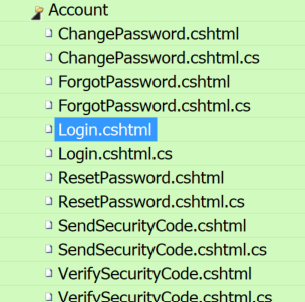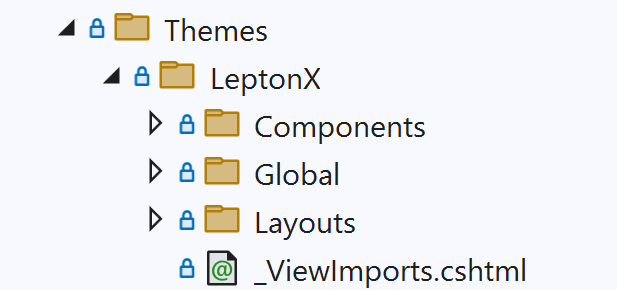The Azure Pipeline was good last Friday. But today it has this error: Unable to load the service index for source https://nuget.abp.io/9acf3724-93dd-4ab1-9a60-3123698a56a3/v3/index.json
After upgrade to Abp 8 (BE use Abp 8.2.3) FE use 8.1.3 (For Saas menu display on ABP 8.2.3) Micro Service Architect
Click account , personal setting, the form content for this line not showing o UI <abp-extensible-form [selectedRecord]="storedProfile"></abp-extensible-form>
In ABP 7:
export interface ProfileDto extends ExtensibleObject {
userName?: string;
email?: string;
emailConfirmed: boolean;
name?: string;
surname?: string;
phoneNumber?: string;
phoneNumberConfirmed: boolean;
isExternal: boolean;
hasPassword: boolean;
concurrencyStamp?: string;
}
In ABP 8:
export interface ProfileDto extends ExtensibleObject {
userName?: string;
email?: string;
emailConfirmed: boolean;
name?: string;
surname?: string;
phoneNumber?: string;
phoneNumberConfirmed: boolean;
isExternal: boolean;
hasPassword: boolean;
supportsMultipleTimezone: boolean;
timezone?: string;
concurrencyStamp?: string;
}
But I think the Dto extra properties should not cause the issue. I create a ProfileDtoLocal as version 7 Dto and bind it to abp-extensible-form, but the UI still black.
Plus, I have a question though, the Dto has many properties, but even on ABP 7 UI only show:= 5 input contorls: User name,, Name, Surname, Email and Phone Number
What is the logic within abp-extensible-form to decide the input control rendered on UI?
ABP 8.2.3 MicroServices Template
When run application locally, after upgrade, the login page layout is good (same as before). However, after the application deployed, the layout is different. How to disable ABP script and css bundle, so that I can compare local version scripts/css and deployed version. I commented the line Config Bundle, the bundle is still there.
Also, I copy over every css, lib, theme folders/files and Theme package back to prior upgrade, the UI still not same as before. Don't understand why.
Thanks, Domina
ABP Framework 8.2.3, Micro Service architect. SQL server Db, any query has .Include() would throw exception:
System.Data.SqlTypes.SqlNullValueException: Data is Null. This method or property cannot be called on Null values. at Microsoft.Data.SqlClient.SqlBuffer.ThrowIfNull() at Microsoft.Data.SqlClient.SqlBuffer.get_String() at Microsoft.Data.SqlClient.SqlDataReader.GetString(Int32 i) at lambda_method1856(Closure, DbDataReader, Int32[]) at Microsoft.EntityFrameworkCore.Query.Internal.BufferedDataReader.BufferedDataRecord.ReadObject(DbDataReader reader, Int32 ordinal, ReaderColumn column) at Microsoft.EntityFrameworkCore.Query.Internal.BufferedDataReader.BufferedDataRecord.ReadRow()
Code: var query = await this.GetQueryableAsync(); var result = await query.Include(x => x.ChildEntity).Where (...).FirstOrDfaultAsync();
I check the EF core mapping and Db data, all valid.
After upgrade to ABP 8.2.1 from ABP 7.2, login as host admin, The "Saas" menu (used for setup tenants and editions) are not visible any more.
I checked the from Administration Db, the AbpPermissionGrants table records are same.
Hi, Per google result, Twilio security code has 30 seconds expiration period, which means if a user use phone MFA within 30 seconds, the user would always get the same security code. It says there is a setting to change this time. With ABP I don't find any setting change the expiration period. Another issue is, after 30 seconds, a new code is generated, however the previous security code still could be used. It's said this is also expected behavior of Twilio. Is it a way to disable previous security code when new code is generated?
Thanks
Our current solution has some custom pages in Auth server project:

After upgrade to ABP 8.2.1 (Theme.LeptonX latest version 3.2.0), on login screen, click the eye icon, the password is not changed to plain text. It must be related to the JS and login page's style and login css. But I don't know where is above pages copy from.

Plus, I also notice there are a Themes folder contains all source code of the theme? Where these files come from?

If compare Administration Db snapshot between 8.2.1 and 8.1.4, we can notice that FlagIcon column is dropped from AbpLanguages. After add Db Migration to Administration Db, we can see the following table schema changes: protected override void Up(MigrationBuilder migrationBuilder) { migrationBuilder.DropColumn( name: "FlagIcon", table: "AbpLanguages"); }
However, after DbMigrator, if we try to launch Admin Service, the swagger is break complain about missing FlagIcon. I checked all Abp NuGet packages are upgraded to 8.2.1
Our project extend some app service in Identity service:
[Dependency(ReplaceServices = true)]
[ExposeServices(typeof(IIdentityUserAppService))]
public class AbcIdentityUserAppService : IdentityUserAppService
{
//Some override methods
//Some new methods
}
When in ABP 7, when generate identity-service proxy, in angular side, there are two sub folder generated, one called abp, one called volo. After upgrade to ABP 8, the proxy for identity-service, only one folder volo generated, the new methods in class AbcIdentityUserAppService is not available for client side to call.
Error: src/app/abp-modules/account/public/src/components/personal-settings/personal-settings.component.ts:61:5 - error TS2740: Type 'FormGroup' is missing the following properties from type 'FormGroup<any>': addValidators, addAsyncValidators, removeValidators, removeAsyncValidators, and 4 more.
61 this.form = generateFormFromProps(data);
Error: src/app/abp-modules/account/public/src/defaults/default-my-security-logs-entity-props.ts:15:5 - error TS2322: Type '(data: Omit<PropData<IdentitySecurityLogDto>, "data">) => Observable<string>' is not assignable to type 'PropCallback<IdentitySecurityLogDto, Observable<any>>'. Type 'Observable<string>' is missing the following properties from type 'Observable<any>': _isScalar, _trySubscribe, _subscribe
15 valueResolver: data => { ....

